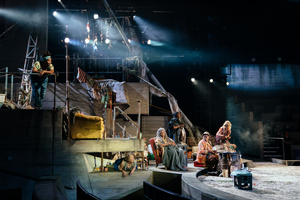Review: PARADISE, National Theatre
Kae Tempest new version of Sophocles' Philoctetes aims a few arrows at present day England

![]() There's talk of an island but this feels more like Fallujah or Aleppo, a dusty place of destruction, its men gone, helicopters circling, sleep a fraught business in which nightmares melt into reality all too easily. Women scrape a living and hope for better times, finding humour in acerbic comments - a chorus of disapproval. Later, we learn (not entirely to our surprise) that the island may well be an abstracted representation of our very own.
There's talk of an island but this feels more like Fallujah or Aleppo, a dusty place of destruction, its men gone, helicopters circling, sleep a fraught business in which nightmares melt into reality all too easily. Women scrape a living and hope for better times, finding humour in acerbic comments - a chorus of disapproval. Later, we learn (not entirely to our surprise) that the island may well be an abstracted representation of our very own.
Two soldiers turn up, 21st century fatigues, but no guns, no phones, no technology at all really. And so an uneasy sliding between classical inspiration (Kae Tempest's Paradise is a new version of Philoctetes by Sophocles) and the present day begins. Those slippages in time ease a little into the background as you enter this hybrid world, but over the somewhat gruelling 110 minutes all-through running time, there are still a few jarring moments, a missing stair in the narrative.
Cynical old hand, Odysseus, explains to the idealistic Neoptolemus that the war may turn on securing the return of Philoctetes to the army, his personality, fighting skills and wondrous weapon ( a bow - not a super fast drone) critical for boosting morale and improving battlefield ops. Odysseus himself cannot undertake the mission because, well, he's the one who left Philoctetes to his fate on the island, gammy leg and all, many years ago. But Neoptolemus will have to compromise his morals and trick his quarry into joining the fight.
There's more than a touch of the briefing Martin Sheen's Captain Willard's receives early in Apocalypse Now in that scene and, when we eventually meet reclusive Philoctetes, there's plenty of Colonel Kurtz in him too, with the chorus his acolytes, his world-weariness all-encompassing and his threat still very much alive. Fortunately, our Greek may share Kurtz's heart of darkness, but he also possesses a dry wit that hits its targets with the same unerring aim as his arrows.
There's charisma there too, but there's also a sentimental sense of entitlement and a need to hang on to what he has, even if he despises it - Kurtz morphs into Albert Steptoe (there's a vocal and facial resemblance too - look at the posters!)
Though the dark comedy frequently bubbles to the surface, there's genuine darkness in scenes that recall the war crimes of Abu Ghraib, the degradation and violence disgusting in its atavistic intimacy, a reminder that fired up patriotism needs very little added to curdle into psychotic nationalism. It's a hard watch.
Rae Smith's set benefits from being in perfect sympathy with the brutalist architecture of the theatre itself, and it provides a fine platform (literally for the chorus) for some pyrotechnic acting. Anastasia Hille gives Odysseus a puffed up self-importance and bravado that matches his ability to dodge confrontation until his luck runs out. Even then, he adopts the self-delusion of Monty Python's infamous Black Knight, pretty much insisting that it's but a flesh wound when we can see it's not.
Gloria Obianyo lends Neoptolemus a child-like quality that makes his subsequent cruelty all the more shocking. It's a useful reminder that wars, even today, are fought mainly by men barely out of boyhood physically and psychologically and one fears for Neoptolemus's future.
Lesley Sharp gets all the best lines, Philoctetes railing against the world (that's mainly 2021's world) as only a man with the moral authority gained by decades living in a cave can. Mostly it's good stuff (and the patter never overpowers the pain, it's a role not a turn after all) but there is a particularly speech that can be received as either a rhetorical tour-de-force or a sixth-form debating society flourish according to taste - and, lest we forget, there's no easier applause-line in London than bashing the nation at the National.
And who, after all, wouldn't want an ageing idealist with a penchant for not caring an iota what people think of him to return in order to rally young people once again to his colours and, this time, usurp a leadership based on pragmatic lies and undercover vindictiveness? I trust the MP for Islington North will attend at some point in the run.
Emerging, somewhat thankfully, into the snap of early Autumn chill, one reflected that this kind of script, and Ian Rickson's production of it (especially in its scale), could probably only be staged at the NT. That verdict can be a double-edged sword, as there's just a little self-indulgence that curls the lip at times. And, as is often the case with unabashed polemical work like this, you're glad you've seen it and equally glad you don't have to see it again.
Paradise continues at The National Theatre until 11 September.
Photo Helen Murray
Reader Reviews

Videos
